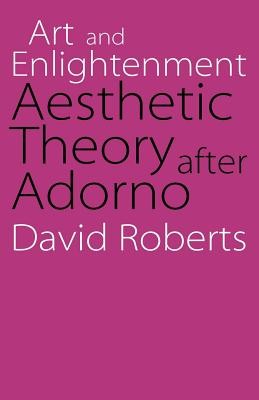
- We will send in 10–14 business days.
- Author: David Roberts
- Publisher: University of Nebraska Press
- ISBN-10: 0803290101
- ISBN-13: 9780803290105
- Format: 14 x 21.6 x 1.5 cm, minkšti viršeliai
- Language: English
- SAVE -10% with code: EXTRA
Reviews
Description
The crisis of tradition early in the twentieth century-signaled by the collapse of perspective in painting and tonality in music and evident in the explosive ferment of the avant-garde movements-opened a new stage of modern art, which aesthetic theory is still struggling to comprehend. David Roberts situates the current aesthetic and cultural debates in a wider historical frame which extends from Hegel and the German Romantics to Lukács and Adorno, Benjamin and Baudrillard. Art and Enlightenment: Aesthetic Theory after Adorno is the first detailed analysis in English of Theodor Adorno's seminal Philosophy of Modern Music, which can be seen as a turning point between modern and postmodern art and theory. Adorno's diagnosis of the crisis of modernist values points back to Hegel's thesis of the end of art and also forward to the postmodernist debate. Thus the paradoxes of Adorno's negative aesthetics return to haunt the current discussion by representatives of the second generation of the Frankfurt School, Anglo-American Marxism, and French poststructuralism. Going beyond Adorno's dialectic of musical enlighten-ment, Roberts proposes an alternative model of the enlightenment, of art applied to literature and exemplified in the outline of a theory of parody. In its critique of Adorno, Art and Enlightenment clears the way for a reconsideration of twentieth-century artistic theory and practice and also, in offering a model of postmodern art, seeks to disentangle critical issues in the discussion of the avant-garde, modernism, and postmodernism. David Roberts, Reader in German at Monash University in Melbourne, Australia, is coeditor of the journal Thesis Eleven. He is the author of The Indirections of Desire: Hamlet in Goethe's "Wilhelm Meister" (1980) and other books.
EXTRA 10 % discount with code: EXTRA
The promotion ends in 22d.02:32:19
The discount code is valid when purchasing from 10 €. Discounts do not stack.
- Author: David Roberts
- Publisher: University of Nebraska Press
- ISBN-10: 0803290101
- ISBN-13: 9780803290105
- Format: 14 x 21.6 x 1.5 cm, minkšti viršeliai
- Language: English English
The crisis of tradition early in the twentieth century-signaled by the collapse of perspective in painting and tonality in music and evident in the explosive ferment of the avant-garde movements-opened a new stage of modern art, which aesthetic theory is still struggling to comprehend. David Roberts situates the current aesthetic and cultural debates in a wider historical frame which extends from Hegel and the German Romantics to Lukács and Adorno, Benjamin and Baudrillard. Art and Enlightenment: Aesthetic Theory after Adorno is the first detailed analysis in English of Theodor Adorno's seminal Philosophy of Modern Music, which can be seen as a turning point between modern and postmodern art and theory. Adorno's diagnosis of the crisis of modernist values points back to Hegel's thesis of the end of art and also forward to the postmodernist debate. Thus the paradoxes of Adorno's negative aesthetics return to haunt the current discussion by representatives of the second generation of the Frankfurt School, Anglo-American Marxism, and French poststructuralism. Going beyond Adorno's dialectic of musical enlighten-ment, Roberts proposes an alternative model of the enlightenment, of art applied to literature and exemplified in the outline of a theory of parody. In its critique of Adorno, Art and Enlightenment clears the way for a reconsideration of twentieth-century artistic theory and practice and also, in offering a model of postmodern art, seeks to disentangle critical issues in the discussion of the avant-garde, modernism, and postmodernism. David Roberts, Reader in German at Monash University in Melbourne, Australia, is coeditor of the journal Thesis Eleven. He is the author of The Indirections of Desire: Hamlet in Goethe's "Wilhelm Meister" (1980) and other books.


Reviews